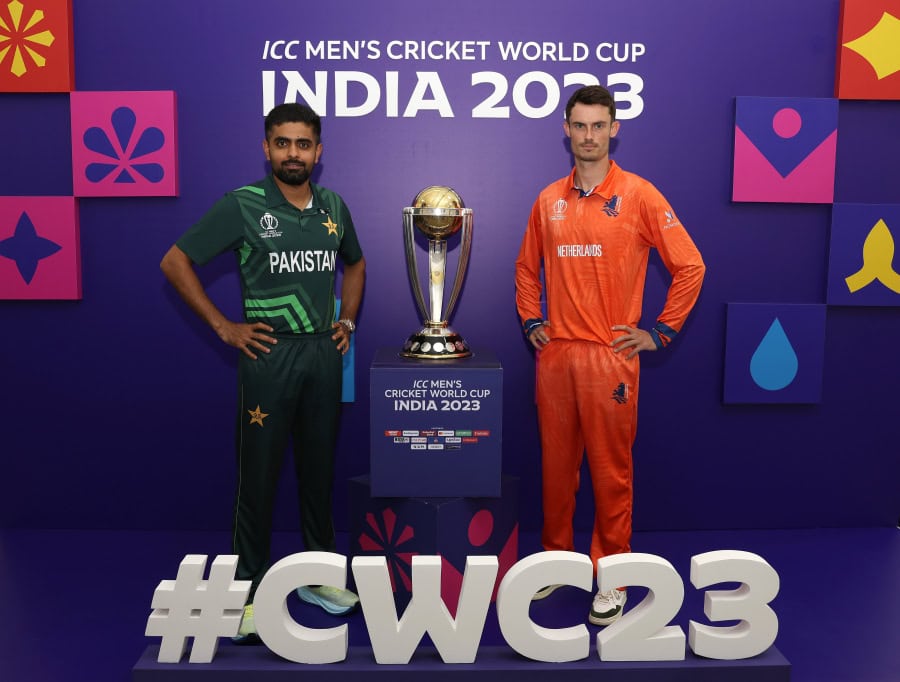The much-anticipated moment for the Pakistan cricket fans arrives tomorrow (Friday) as Pakistan begin their ICC Men’s Cricket World Cup 2023 campaign against the Netherlands at Hyderabad’s Rajiv Gandhi International Cricket Stadium.
Since arriving in the city eight days ago, which also marked the first instance of a Pakistan men’s side landing in India in seven years, Babar Azam’s side has made the most of the training sessions and two warm-up games to acclimatise in the city where they play first two of their nine league matches.
The warm-up games against New Zealand and Australia also served opportunities to Pakistan to fine-tune their combinations and provide the much-needed match time to the entire squad.
“We have been in Hyderabad for a week and our preparations have been really good,” Babar told PCB Digital on the eve of Pakistan’s tournament opener.
“We have had two practice matches in which we tried different combinations and gave everyone an opportunity to see if they could play in any situation. Overall our practice went well and we will give our best.”
Pakistan enter the 50-over World Cup as one of the favourites after an impressive run in the just-concluded World Cup cycle as they had the best win-loss ratio of 2.400 with 24 wins in 36 matches. That the team has performed so consistently has also been because of their mainstays emerging as solid performers over the years.
Their captain, Babar, has evolved into a modern-day great since recording the most runs for a Pakistani at a World Cup in the 2019 iteration and is perched at the top of the ICC ODI rankings for batters. He is one of the two players to score over 2,000 runs in the last four years. His impressive 2,196 runs have been at an average of 66.54 and a strike rate of 93.72.
He has smashed nine centuries in this period, which is the joint-most with Shai Hope, who is the other batter to breach the 2,000-run mark.
Babar’s compatriot and a close friend Imam-ul-Haq is ranked sixth with 1,284 runs at an average of 45.85 and a strike rate of 84.41. He has struck two centuries and 13 half-centuries in the past four years.
Shaheen Afridi, who became the youngest bowler to bag a five-wicket haul in his last ICC Men’s Cricket World Cup contest, has emerged as one of the most-feared bowlers in the game.
Such has been his impact in the format that despite being on the sidelines for around seven months because of a knee injury, Shaheen has been one of the key bowlers in the vaunted Pakistan’s pace attack. He has 46 wickets in the last four years at 25.26 and with an impressive economy of 5.42.
In between the two editions, Pakistan continued to produce exciting fast bowling talents. Haris Rauf, who debuted in October 2020, has made a name for himself by producing excellent spells in arguably the hardest phase of the ODI game – the middle overs. He surpassed the 50-wicket mark in the recent Men’s ODI Asia Cup 2023 and has 53 scalps to his name, but the most fascinating bit of his bowling has been the economy, which has been 5.68.
“Both bowling and batting are our strengths,” Babar replied when asked what he felt his side’s strengths are.
“Our batters have been performing from the top-order down to the lower-order. Every player is stepping up and taking responsibility. In bowling, our fast bowling has always been our strength but even our spinners are showing promise. Since we have come to India, we have seen our spinners take wickets in the middle overs, which is a good sign. We will try and keep this momentum going.”
When Pakistan take on the Netherlands on Friday, it will be the first time in a little less than in 11 years that they will play an ODI on the Indian soil. They have not played a single 50-over international game in Hyderabad since 1987, but the team has made sure that they have all preparations in place for the mega-event.
“As far as my experience goes, and having watched matches in India on television, I’ll say the pitches seem really good. Matches are going to be high scoring. As for the boundaries, they are normal-sized, not too small but not too big either. The pitches are true – sometimes you need a little more time (as a batter) early on (in the game), but once you play on it for a while it feels really good. There is not much margin for the bowlers as they have to keep their lines wicket-to-wicket and deploy variations. If they err in lines, then the batters are going to make the most of it.”
The Friday meeting between Pakistan and the Netherlands would be the seventh time they face off in an ODI. The two sides have faced off six times in the format, their first meeting in the 1996 iteration of the ICC Men’s Cricket World Cup, and Pakistan have come out victorious on each occasion. Pakistan toured the Netherlands last year for what was the first bilateral series between the two sides, and recorded a clean-sweep.










